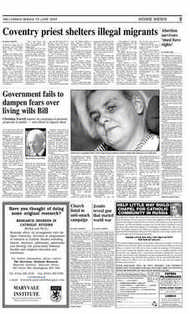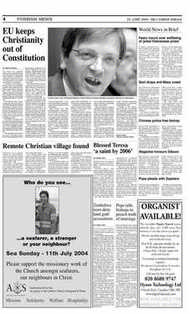Page 8, 25th June 2004
Page 8

Report an error
Noticed an error on this page?If you've noticed an error in this article please click here to report it.
Tags
Share
Related articles
Questions Papal Apology
Inquisition Myths Debunked
Penitence And The Weight Of History
Praying For Torquemada To Be Forgiven — But No Apologies
Europe
Catholics should not feel guilty for the Inquisition
The Pope has issued a conditional apology for the excesses of the Spanish Inquisition.
But does it make sense, asks historian Dr Alastair Duke, for modern Catholics to
seek forgiveness for misdeeds committed by Churchmen so many years ago?
In 1834 the Spanish Inquisition was suppressed (for the second time) and in 1965 the Holy Office, as the Roman Inquisition was usually called, was transmuted into the Sacred Congregation for the Doctrine of the Faith. Yet the memory of the Inquisition did not fade away; on the contrary, its sinister reputation remained a source of embarrassment to many Catholics and an affront to liberals, Protestants and other non-Catholics. In a bid to square up to this troubled past John Paul II, in 1998, created a historico-theological commission to sift the facts from the myths about the Inquisition. Only when this had been done, it was argued, could the Church ask God’s forgiveness for the cruelty and injustice perpetrated by those responsible for safeguarding orthodoxy. Accordingly, later that year some 30 historians, by no means all Catholics, were invited to the Vatican to give expert testimony, based on their knowledge of how the Inquisition had operated.
The range and diversity of the evidence made it difficult to reach hard-and-fast conclusions. But it did scotch the scandalous reputation of the Inquisition as the all-powerful, bloodthirsty tribunal of popular imagination. This was scarcely surprising, for this Inquisition was very largely a Protestant and liberal concoction. Historians have, for example, long known that the infamous sentence of 1568, supposedly delivered by the Spanish Inquisition condemning the entire population of the Low Countries (present day Belgium and the Netherlands) to death as heretics, was a piece of black propaganda forged by the Dutch in their conflict with Spain. The picture that emerged was complicated, not least because there was not one, but several, inquisitions, sometimes in competition with one another and with the secular courts. Since the later middle ages the papacy had commissioned inquisitors, often Dominicans, to root out heresy, and in the late fifteenth century the Spanish monarchy set up its own state-run inquisition. And finally, there was the Roman Inquisition.
In southern Europe the influence of the Inquisition was pervasive, extending even to the Portuguese and Spanish overseas empires. With their armies of informers, the inquisitors could police Italy, and especially Spain, like hawks. No one was immune from prosecution, be they freethinking peasants, front rank theologians such as Carranza, Archbishop of Toledo, or mathematical geniuses such as Galileo. Trials were often lengthy, held in secret and the identity of witnesses was not disclosed. Torture, however, was not routine (as it often was in the secular criminal courts on the Continent), though the accused were put under unimaginable psychological pressure by virtue of their isolation. This tribunal was not especially sanguinary: over all, only one per cent of the 125,000 cases that came before the Spanish Inquisition ended in a death sentence. Like modern secret police forces, the Spanish inquisitors in particular were meticulous keepers of records, which have been gratefully quarried by generations of historians. The inquisitors relied on informers, but they were not credulous. Their remarkable scepticism when confronted with allegations of witchcraft spared Spain the terrible witchcrazes that claimed so many victims elsewhere in both Protestant and Catholic countries. This Inquisition was above all concerned to secure religious and moral conformity. Those convicted were therefore often marked out by having to wear a shameful penitential dress, and their san benitos delivered a powerful warning: conform or be humiliated.
So the Spanish and Roman Inquisitions were powerful, but they were by no means as bloodthirsty as has been supposed. Collectively these inquisitions condemned fewer than 250 Protestants to death during the entire sixteenth century, as against the 280 or so sentenced by the English church courts, assisted by the local justices, during Mary Tudor’s brief reign. In the light of this information, the papal apology with regard to the Inquisition has to some degree been qualified. As Cardinal Cottier who prepared the symposium on the Inquisition recently explained: “Forgiveness can only refer to facts that are true and objectively recognised.” But the religious repression extended well beyond the inquisitions or, in the case of England, the episcopal courts. The great majority of the roughly 1,300 Protestants sentenced to death in the Low Countries from 1523 to 1566 were condemned by secular, and not by ecclesiastical, courts, yet the powers that be used coercion primarily in defence of the Catholic faith. The ruler Charles V and his son Philip II of Spain saw the defence of the Church as their highest obligation and they therefore had no hesitation in promoting the rigorous prosecution of heretics. In some respects the secular criminal law was harsher than canon law: whereas penitent offenders coming before inquisitors might escape with a prison sentence or some lesser penance, those convicted in the ordinary criminal courts of having in their possession a forbidden book were liable to the death penalty. In several important respects, Charles V’s antiheresy legislation drew directly on Church law and the practices of the medieval Inquisition, but the secular courts here also regularly employed torture to obtain information and extract confessions. Church and State combined in much the same way in France and Germany, or the Holy Roman Empire as it was then known. In other words, the Inquisitors were not the only guardians of the Catholic faith whose zeal misled them into using “violence in the service of truth”. To that extent, the focus of the apology on the institution of the Inquisition has been couched rather too narrowly to fulfil the function of purifying the memory to which John Paul II aspired.
More generally I wonder about the utility and validity of such apologies. While one can only admire the courage of those who were prepared to raise these painful questions, questions which some within the hierarchy would have understandably preferred left uninvestigated, a mea culpa cannot, as seems to have been the hope here, draw a line or wipe the slate clean. “History,” as a Dutch scholar once remarked, “is an argument without end”, and new research will open up quite fresh insights. Indeed it is one of the great achievements of this symposium to have done precisely that. Openness and continued robust discussion, rather than one-off apologies, no matter how sincerely and carefully prepared, are what is called for.
Secondly, it is far from clear whether and how institutions, as opposed to individuals, can seek forgiveness for misdeeds committed against individuals who died so long ago. Catholics today can scarcely be expected to take ownership for such apologies; they cannot, nor should they feel any sense of guilt for the actions of, in this case, the inquisitors whose mindset was so very different from their own. Rather than seeking forgiveness and closure, we should perhaps keep painful and shameful memories — and Protestants have plenty to be ashamed of too — alive, because they teach us how readily we commit acts of inhumanity, even when, as was often the case with the inquisitors, we act from a holy zeal for the truth.
Dr Alastair Duke taught History at the University of Southampton
blog comments powered by Disqus















